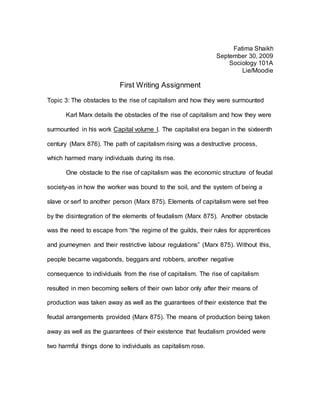
First Writing Assignment
- 1. Fatima Shaikh September 30, 2009 Sociology 101A Lie/Moodie First Writing Assignment Topic 3: The obstacles to the rise of capitalism and how they were surmounted Karl Marx details the obstacles of the rise of capitalism and how they were surmounted in his work Capital volume I. The capitalist era began in the sixteenth century (Marx 876). The path of capitalism rising was a destructive process, which harmed many individuals during its rise. One obstacle to the rise of capitalism was the economic structure of feudal society-as in how the worker was bound to the soil, and the system of being a slave or serf to another person (Marx 875). Elements of capitalism were set free by the disintegration of the elements of feudalism (Marx 875). Another obstacle was the need to escape from “the regime of the guilds, their rules for apprentices and journeymen and their restrictive labour regulations” (Marx 875). Without this, people became vagabonds, beggars and robbers, another negative consequence to individuals from the rise of capitalism. The rise of capitalism resulted in men becoming sellers of their own labor only after their means of production was taken away as well as the guarantees of their existence that the feudal arrangements provided (Marx 875). The means of production being taken away as well as the guarantees of their existence that feudalism provided were two harmful things done to individuals as capitalism rose.
- 2. The harmful aspect of capitalism can be pointed out by how the starting point of the development that gave rise to the wage-laborer and capitalist was the enslavement of the worker (Marx 875). There was a change from feudal exploitation to capitalist exploitation (Marx 875). The enslavement of the worker was caused by the means of production being taken away from the worker. What preceded the capitalist revolution took place in the last third of the fifteenth century and the first few decades of the sixteenth (Marx 881). A lot of free and “unattached” proletarians were pushed into the labor market by the disintegration of the bands of feudal retainers (Marx 878). The disintegration of the monasteries also pushed their inmates into the proletariat (Marx 881). The systematic theft of communal property as well as the theft of state domains made the large capital farms increase in size and increased the agricultural population as a proletariat for the “needs of industry” (Marx 886). This step toward capitalism was harmful to individuals because they were “dragged from their accustomed mode of life” and could not adapt quickly to their new “condition” (Marx 896). In large numbers these people turned into beggars, robbers and vagabonds, partly “from inclination” but mostly because of the “force of their circumstances”, a negative impact to individuals from capitalism (Marx 896). To add to the rise of capitalism’s harmful effects, these vagabonds and paupers were treated as ‘voluntary’ criminals by legislation that assumed that it was fully in their control to go on working under the “old conditions that no longer existed” (Marx 896). The vagabonds were whipped, branded and tortured by “grotesquely
- 3. terroristic” laws into accepting the “discipline necessary for the system of wage- labor” (Marx 899). In Karl Marx’s work Capital volume I it can be seen that the path of the rise of capitalism was a destructive one for many individuals. This can be seen by how the means of production was taken away from workers and the guarantees of their existence that the feudal arrangements provided. The expropriation of the agricultural population was another harmful effect of the rise of capitalism. This population was also turned into beggars, robbers and vagabonds that were prosecuted. Clearly the path to capitalism caused the suffering of many.